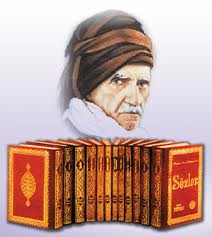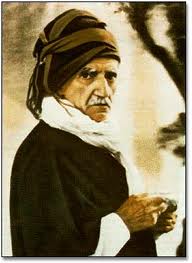Damascus Sermon 6- The Recipe of Ummah’s illnesses and foresight of Future Islamic World by Bediüzzaman Said Nursi(1873- 1960)

 Third Word by Bediüzzaman Said Nursi (1873- 1960) in Umayyad Mosque ( Damascus) in 1911
Third Word by Bediüzzaman Said Nursi (1873- 1960) in Umayyad Mosque ( Damascus) in 1911
This Third Word I have learnt from the studies and researches I have carried out in the course of my life and from my experience of the ups and downs of social life; its summary and essence are as follows: truthfulness is the basis and foundation of Islam, and the bond between people of good character, and the basis of elevated emotions. Since this is so, as the foundation of the life of our society, we must bring to life truthfulness and honesty, and cure our moral and spiritual sicknesses with them.
Yes, truthfulness and honesty are the vital principles in the life of Islamic society. Hypocrisy is a sort of actualized lying. Flattery and artifice are cowardly lying. Duplicity and doubledealing are harmful lying. And as for lying, it is to slander the AllGlorious Maker’s power.
Unbelief in all its varieties is falsehood and lying. Belief is truthfulness and honesty.As a consequence of this, there is a limitless distance between truth and falsehood; they should be as distant from one another as the East is from the West. Like fire and light, they should not become mixed with one another. However, cruel politics and tyrannical propaganda have mixed and confused them, and have also thrown into confusion man’s achievements.(12)
—————————-
(12) O my brothers! It may be thought from this lesson of the Old Said that he was excessively concerned with politics and the social mat-ters of Islam. But be careful, do not suppose he had taken the way of making religion a tool or means of politics. God forbid! With all his strength, he was making politics the tool of religion. He used to say: “I prefer one truth of religion to a thousand matters of poli-tics. Indeed, he perceived at that time forty to fifty years ago that certain two-faced atheists were attempting to make politics the tool of irreligion, and in response to those aims and ideas of theirs, he tried to make politics a servant and tool of Islam and its truths.
However, twenty years later he saw that, in response to those clandestine double-dealing atheists’ efforts to make politics the tool of irreligion, which they were doing under the pretext of westerni-zation, a number of religious politicians were trying to make relig-ion the tool of Islamic politics. But the sun of Islam cannot follow and be the tool of lights on the ground. And to make Islam a tool is to reduce its value and is a great crime. The Old Said even saw a pious scholar who, as a result of that sort of partisan politics, was enthusiastically praising a dissembler who agreed with his own po-litical leanings, while criticizing and declaring to be deviant an up-right teacher who opposed them. The Old Said said to him: “Should a devil support your political ideas, you would interpret it as mercy, and if an angel were to oppose them, you would curse him.” As a result of this, the Old Said declared: “I seek refuge with God from Satan and politics,” and for thirty-five years has given up politics.13
Signed: Said Nursi
(13) Since the New Said gave up politics completely and did not follow them at all, the Turkish translation of the Damascus Sermon, a les-son of the Old Said which touches on politics, has been printed and made available.14
(14) Furthermore, although the twenty-seven years of the New Said’s life together with the hundred and thirty sections of his writings and letters have been minutely examined by three courts (now one thousand courts) and by government officials; and although he was compelled to oppose the evil-doing apostates and double-dealers who were working against him; and although the order had even been given secretly for his execution; the fact that they were unable to find even the slightest indication suggesting that he had exploited religion for political ends proves decisively that he had not done so. We students of the Risale-i Nur are in wonder at this extraordinary situation and consider it to be a sign of the true sincerity that exists within the sphere of the Risale-i Nur.
Truthfulness and lying are as distant from one another as are belief and unbelief. With Muhammad’s rising to the highest of the high by means of truthfulness in the Era of Bliss, and with the treasury of the truths of belief and the truths of the universe being unlocked with the key of truthfulness, truthfulness became the most valuable merchandise in the market of human society, and the goods most in demand.
Because of lying, the likes of Musaylima the Liar fell to the lowest of the low. Since that mighty revolution showed that at that time lying and falsehood were the key to blasphemies and superstition, they became one of the worst and filthiest goods on the market of the universe, and it was not as though everyone wanted to buy them, indeed, everyone detested them. Certainly the Companions, who were in the first line of that mighty revolution and in whose nature it was to buy things that were the cause of pride and to be customers for the most valuable goods and those most in demand, would never knowingly have advocated any falsehood. They would not have soiled themselves with lying. They would not have made themselves resemble Musaylima the Liar.
Indeed, since with all their strength and through innate disposition they were customers for truthfulness
and honesty, which formed the steps whereby Muhammad (Upon whom be blessings and peace) rose to the highest of the high, and were the most soughtafter merchandise and the most valuable commodity and the key to realities, and since as far as was possible they tried not to depart from truthfulness, it became an established principle in the science of Hadith and among scholars of the Shari‘a that “the Companions always spoke the truth. Their narrations do not require to be investigated in the same way as other narrations. The Hadiths they related from the Prophet (PBUH) are all sound.” A decisive argument for the consensus of the scholars of Hadith and the Shari‘a is this fact. Thus, at the time of the mighty revolution in the Era of Bliss truthfulness and lying were as far from one another as belief and unbelief, yet with the passing of time they have gradually drawn closer to each other. Political propaganda has sometimes given greater currency to lies, and evil and lying have to some degree taken the stage. It is because of this fact that no one could attain to the level of the Companions. Since this has been discussed in the Addendum to the TwentySeventh Word, which is about the Companions, we refer you to that and cut short the matter here.
O my brothers here in this Umayyad Mosque! And O my brothers who, forty to fifty years later, form the four hundred million believers in the vast mosque of the world of Islam! Salvation is only to be found through truthfulness and honesty. The “support most unfailing ”(15) is honesty. That is to say, the strongest chain with which to be bound to salvation is honesty.
However, sometimes in the past lying abrogated this if there were advantages to be gained. Some scholars issued ‘temporary’ fatwas in case of necessity or for benefit. But in this age, such fatwas may not be given. For it has been abused so much that there may be only one benefit among a hundred harms. The judgement cannot therefore be based on benefit.
For example, the cause for shortening the ritual prayers while on a journey is hardship. But it cannot be the reason. For it has no determined limit and may be abused. The reason may only be the journey. Similarly, benefit may not be the reason for telling a lie. Because it has no specified limit and is a swamp breeding abuse. The judgement for a fatwa may not be based on it. In which case, “Either truthfulness or silence.” That is, there are two ways, not three; that is, not either the truth, or lies, or silence.
Since public order and security have been overturned through mankind’s evident and ghastly lying and wilful misrepresentations, and through its abuse of benefits, mankind is clearly commanded and compelled to close the third way. Otherwise, the world wars, hideous revolutions, and decline and destruction that humanity has suffered in the past halfcentury will bring down some overwhelming disaster on men’s heads.
————————-
(15) Qur’an, 2:256.
Indeed, everything you say must be true, but it is not right to say everything true. If on occasion it is damaging, then be silent. But there is no fatwa for lying. Everything you say must be the truth, but you do not have the right to say everything that is true. Because if it is not sincere, it will have a detrimental effect and truth will be spent on wrong.
The next parts of ‘Damascus Sermon’ will continue.







